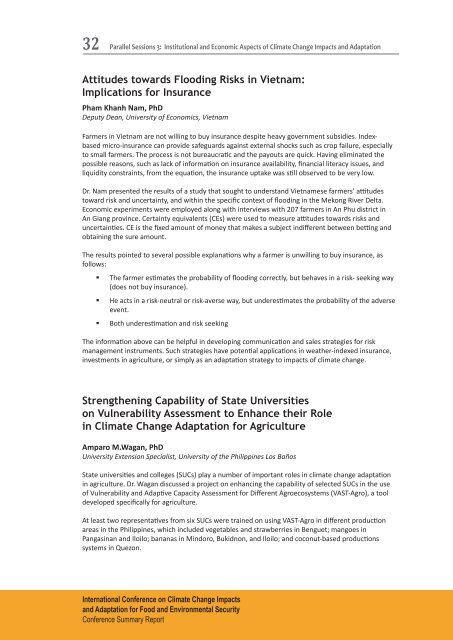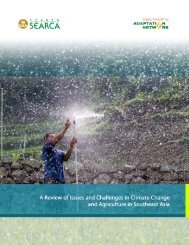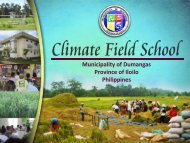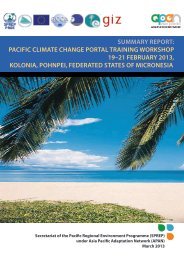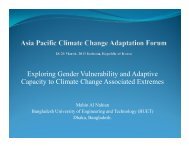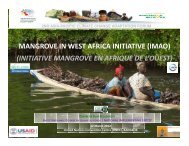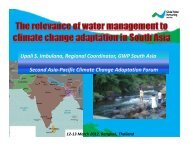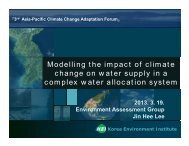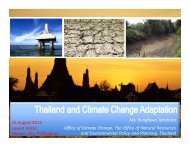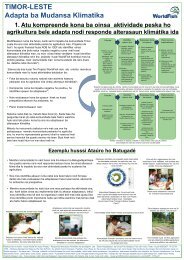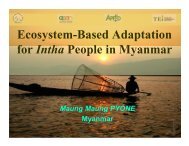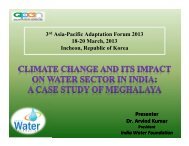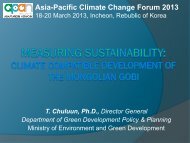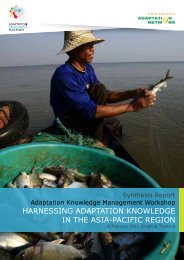PDF file (2.44 MB) - Asia Pacific Adaptation Network
PDF file (2.44 MB) - Asia Pacific Adaptation Network
PDF file (2.44 MB) - Asia Pacific Adaptation Network
Create successful ePaper yourself
Turn your PDF publications into a flip-book with our unique Google optimized e-Paper software.
32Parallel Sessions 3: Institutional and Economic Aspects of Climate Change Impacts and <strong>Adaptation</strong>Attitudes towards Flooding Risks in Vietnam:Implications for InsurancePham Khanh Nam, PhDDeputy Dean, University of Economics, VietnamFarmers in Vietnam are not willing to buy insurance despite heavy government subsidies. Indexbasedmicro-insurance can provide safeguards against external shocks such as crop failure, especiallyto small farmers. The process is not bureaucratic and the payouts are quick. Having eliminated thepossible reasons, such as lack of information on insurance availability, financial literacy issues, andliquidity constraints, from the equation, the insurance uptake was still observed to be very low.Dr. Nam presented the results of a study that sought to understand Vietnamese farmers’ attitudestoward risk and uncertainty, and within the specific context of flooding in the Mekong River Delta.Economic experiments were employed along with interviews with 207 farmers in An Phu district inAn Giang province. Certainty equivalents (CEs) were used to measure attitudes towards risks anduncertainties. CE is the fixed amount of money that makes a subject indifferent between betting andobtaining the sure amount.The results pointed to several possible explanations why a farmer is unwilling to buy insurance, asfollows:• The farmer estimates the probability of flooding correctly, but behaves in a risk- seeking way(does not buy insurance).• He acts in a risk-neutral or risk-averse way, but underestimates the probability of the adverseevent.• Both underestimation and risk seekingThe information above can be helpful in developing communication and sales strategies for riskmanagement instruments. Such strategies have potential applications in weather-indexed insurance,investments in agriculture, or simply as an adaptation strategy to impacts of climate change.Strengthening Capability of State Universitieson Vulnerability Assessment to Enhance their Rolein Climate Change <strong>Adaptation</strong> for AgricultureAmparo M.Wagan, PhDUniversity Extension Specialist, University of the Philippines Los BañosState universities and colleges (SUCs) play a number of important roles in climate change adaptationin agriculture. Dr. Wagan discussed a project on enhancing the capability of selected SUCs in the useof Vulnerability and Adaptive Capacity Assessment for Different Agroecosystems (VAST-Agro), a tooldeveloped specifically for agriculture.At least two representatives from six SUCs were trained on using VAST-Agro in different productionareas in the Philippines, which included vegetables and strawberries in Benguet; mangoes inPangasinan and Iloilo; bananas in Mindoro, Bukidnon, and Iloilo; and coconut-based productionssystems in Quezon.International Conference on Climate Change Impactsand <strong>Adaptation</strong> for Food and Environmental SecurityConference Summary Report


